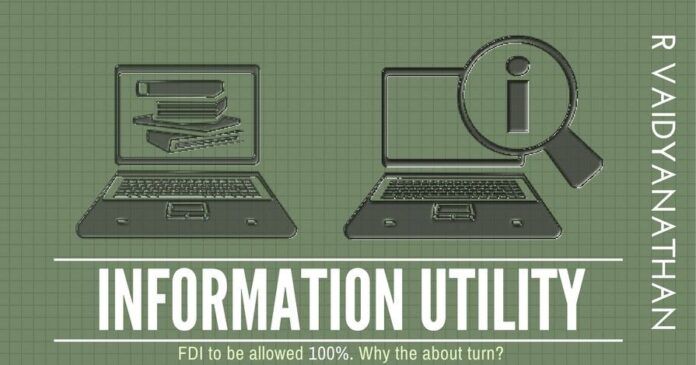
What are the unknown motives for a sudden about turn in policy of Foreign direct investment in Information Utility entities under the Insolvency & Bankruptcy Code?
The aim of the [Information Utility entities] IU regulations is to ensure that sensitive financial data of the country stored in an IU is managed and governed by a diverse set of large financial institutions with a fit and proper track record so that corporate governance is ensured much like that of other market infrastructure institutions like exchanges and depositories in India in the last 20 years in other parts of the Financial Sector. Accordingly, the following is the core operating context of IU:
- IU is a legal engineering to establish questions of fact in enforcement of a financial contract between borrowers and banks/Financial Institution by providing electronic legal evidence of fact of borrowing, fact of default and fact of security interest over assets through an authentication process where the borrowers’ commit fully to the above facts.
- IU is expected to function by storing sensitive credit data throughout the loan cycle of borrowing, repayment, default and collateral impairment. This constitutes personal data of borrowers in real life scenario with large manifestation in the Indian society and implications on leakage of data on indebtedness, reneging on repayment etc. Therefore, the IU must handle these aspects with due sensitivity.
- IU should not do any judgemental role-based on the data it stores.
- IU is expected to obtain authentication from both borrower and lender and as such is a neutral entity with no affiliation to either side of financial contracts.
- IU is expected to store information electronically in their computer hardware and therefore store the same within India. Adjudicating Authority (AA) could seek the fairness of the electronic storage and retrieval process before deciding the cases as the decision of the AA may be prejudicial to the interest of borrowers as it may lose capacity to enter into a valid contract, an essential aspect of life and fundamental liberty in a democratic set up.
In the Indian context, it may be desirable for the government to deliberate at the highest levels to ensure a consistent and uniform policy towards foreign participation in sensitive sectors considering India’s strategic, sovereign, social and cultural interest as upper most.
Since the data held in IU is even more sensitive than that held in the Exchanges and depositories and therefore it stands to reason that decisions of the level of FDI in market infrastructure intermediaries in the financial sector must have uniformity.
It cannot be that it is 49% cap on FDI for securities market and 100% for aggregated data held by information utilities in the credit industry that goes even beyond banks.
It is important that such decisions need to be viewed from security perspectives of foreigners holding and controlling data of the entire country as well as from concepts of Reciprocity as understood in international law. In a turbulent world India can ill-afford to expose its economic vulnerabilities to the rest of the world, especially given the numerous instances of penetration of computer systems by enemy forces and the ease with which managements of companies can be bought by opulent packages and short-termism, which were at the core of the recent global financial crisis. What has emerged is that western systems are not worth emulating as they are found to be weak and porous and values and culture within entities in India can provide greater re-assurance to the people of India.
The about turn in less than six months from the issuance of regulations by the Insolvency and Bankruptcy Board of India [IBBI] (see below Appendix) is most intriguing. IBBI has sought public comments on 17th August 2017, on the proposed changes in foreign ownership of IUs thru their website as summarized below:
- IU, as per the Insolvency and Bankruptcy Code [IBC], is a competitive industry with inter-operability amongst IU works for the benefit of consumers.
- Foreign ownership brings with itself the best practices and conserves domestic capital for alternative uses.
- Data mining technologies could help Indian credit market to arrive at enhancing credit and investment portfolio quality and returns.
- Internationalization of Industries is emerging norm and cross border market experience could benefit the financial sector.
- India benefited from foreign ownership in real economy like Telecom, Aviation, etc.
Against the backdrop of the above enumerations, the demerits of foreign control or majority for FDI in an IU and challenges in such a public policy are:
- IU data is sensitive covering the citizens and companies registered in India and having significant borrowings from the financial market. This data is expected to be collected on a near real-time basis and therefore exposes the information to possible abuse triggered by economic and devious incentives.
- The repercussions of misuse of this data/ information by foreign entities can be far-reaching and extremely dangerous and can put the country in a difficult situation.
- IU is a India specific institutional intervention aimed at addressing the delay in civil courts arising out of rigor in evidentiary requirement to prove indebtedness, default and evaporation of security interest
- Like a registry, an IU is expected to perform a quasi-sovereign role similar to that of records of a registrar office holding data on title to property or encumbrances.
- Socio-cultural taboos surrounding borrowing, default and enforcement actions need sensitivity to Indian culture, ethos and respect for Indian-ness. It is not unheard of when bank officials visit to enforce retail borrowers’ overdue, the citizens sometime commit “suicide”, though very unfortunate.
- IU role is expected to facilitate the adjudicating machinery and assist the insolvent in faster resolution of financial problems and undertake “Fresh Start“ process. This culture of accepting failure by society is required for entrepreneurship.
- Within the banking business, India had DICGC facility where credit guarantee system could not achieve significant results due to various operational challenges and as such the unique initiative of using IU to enforce dues of banks need to be approached with constant evolution of IU market calibrated by experience/data.
- Currently the era of Globalization is being seriously revisited by various countries which had free flow of capital as well as immigration due to various needs of their strategic interests. Under no circumstances can liberalization imply that countries cannot pursue policies that benefits their economic and sovereign interest such as restrictions on foreign ownership and Industries where foreign ownership is allowed. Therefore, in an Industry where data representing ECONOMIC INDIA is to be held, a question arises as to whether such industry is to be exposed to foreign ownership without any reciprocal arrangement.
- If the argument for foreign ownership is for technology reasons, then it falls flat for the reason that it is only the Indian IT companies like TCS that have served financial sector world over.
- The role of IU is in the nature of an Information Repository akin to depositories functioning in financial sector. India’s long term view on foreign participation in these information repositories has been to restrict foreign capital and allowing them corporate control of over 49% may be very risky. Identifying beneficial ownership of foreign holdings, whether in enemy hands on not, was and is always difficult.
- Ongoing battle on right to privacy with the matter being examined by nine member bench of the Supreme Court of India is yet another aspect involving data security on an aspect which has serious implications on the concerned citizens unable to honour financial obligations. As designed in AADHAR, a Government body or a similar structure of a Govt controlled entity may therefore be relevant in the context of IUs with the entity holding itself responsible like public servants with duty to protect the public interest prima facie.
In the Indian context, it may be desirable for government to deliberate at the highest levels to ensure a consistent and uniform policy towards foreign participation in sensitive sectors considering India’s strategic, sovereign, social and cultural interest as upper most. With about 60% of banks owned by Government, possible failure by IU to deliver and contain NPA growth may well impact public finances besides creating anaemic credit growth. Over a medium term, a view could be examined based on emerging economic, social and cultural issues; especially sensitivity of Indians to borrowing and “possible negative behaviour” to admit loan delinquencies with extreme steps of suicide by borrowers due to their inability to honour financial obligations kept uppermost in mind.
Hence in our context Government and Finance Ministry must answer the reason for such a decision.
Appendix:
FDI limit in Infrastructure companies in Securities Market in India (Relevant Legal Provisions)
- As per consolidated FDI Policy 2016:
- 2 Permitted Sectors
- a) In the following sectors/activities, FDI up to the limit indicated against each sector/activity is allowed, subject to applicable laws/regulations; security and other cond In sectors/activities not listed below, FDI is permitted up to100% on the automatic route, subject to applicable laws/regulations; security and other conditionalities. Wherever there is a requirement of minimum capitalization, it shall include share premium received along with the face value of the share, only when it is received by the company upon issue of the shares to the non-resident investor. Amount paid by the transferee during post-issue transfer of shares beyond the issue price of the share, cannot be taken into account while calculating minimum capitalization requirement.
- 2.21 Infrastructure Company in the Securities Market
| Sector/Activity | % of Equity /FDI Cap | Entry Route |
| 5.2.21.1Infrastructure companies in Securities Markets, namely, stock exchanges, commodity exchanges, depositories and clearing corporations, in compliance with SEBI Regulations | 49% | Automatic |
- 2.21.2 Other Conditions
(i) FII/FPI can invest only through purchases in the secondary market.
(ii) No non-resident investor/entity, including persons acting in concert, will hold more than 5% of the equity in commodity exchanges.
(iii) Foreign investment in commodity exchanges will be subject to the guidelines of the Central Government/SEBI from time to time.
[Reg. 3]: Eligibility for registration.
No person shall be eligible to be registered as an information utility unless it is a public company and –
(a) its sole object is to provide core services and other services under these Regulations, and discharge such functions as may be necessary for providing these services;
(b) its shareholding and governance is in accordance with Chapter III;
(e) it is not under the control of person(s) resident outside India;
(f) not more than 49% of its total voting power or its paid-up equity share capital is held, directly or indirectly, by persons resident outside India;
[Reg. 8]: Shareholding: (For Information)
(1) No person shall at any time, directly or indirectly, either by itself or together with persons acting in concert, acquire or hold more than ten per cent of the paid-up equity share capital or total voting power of an information utility:
Provided that the following persons may, directly or indirectly, either by themselves or together in concert, acquire or hold up to twenty-five percent of the paid-up equity share capital or total voting power of an information utility:-
(a) government company;
(b) stock exchange;
(c) depository;
(d) bank;
(e) insurance company; and
(f) public financial institution.
(2) Notwithstanding anything to the contrary contained in sub-regulation (1), a person resident in India may, directly or indirectly, either by itself or together with persons acting in concert, hold up to fifty-one percent of the paid-up equity share capital or total voting power of an information utility till the expiry of three years from the date of its registration, or such period as may be extended by the Board.
(3) The provisions of this Regulation shall not apply to the holding of shares or voting power by the Central Government or a State Government.
- नकली खबर लक्षण है, बीमारी नहीं! - April 16, 2018
- Fake News/ Accreditation and Sedition - April 4, 2018
- Two Poisonous Seeds - March 15, 2018










